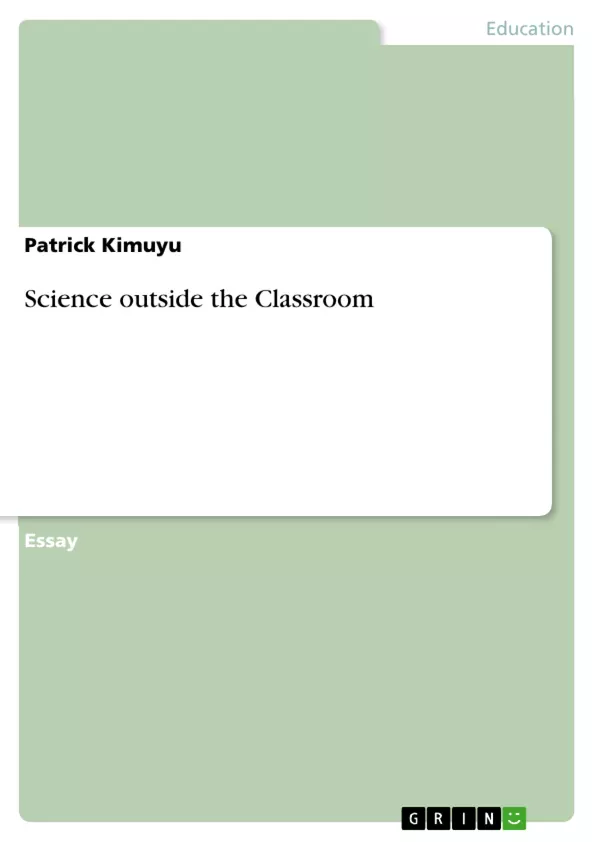Science appears to have dominated all aspects of mankind in the universe. It is blatantly true to assert that the future of mankind is immensely depended on scientific prosperity. Today, scientific innovations have taken the center stage in social and economic development. Moreover, science has become extensively under twinned with the cultural heritage of the global community. Therefore, scientific literacy among the global population appears to be the most appropriate answer to the survival of mankind in the universe. Clough (2010) states, “Scientific literacy is an urgent and important issue. Why should we care? The answer is simple: Our way of life and our survival are at stake.”
Inhaltsverzeichnis (Table of Contents)
- Science Education for the 21st Century
- Purpose of Science Education
- Fundamentals of Future Science
- Modern Ways of Teaching Science
- Challenges and Implications for Science Teachers
- The Importance of Scientific Literacy
- Science and the Future
- The Role of School Science Education
- Utilitarian Purpose of Science Education
- Professional Training Purpose of Science Education
- Citizenship Purpose of Science Education
- Intellectual Enculturation Purpose of Science Education
- Restructuring Science Education
- Purpose-Specific Aims
- Stratification of Science Education
- Challenges for Science Teachers
- Curriculum, Assessment, and Pedagogy
- The Teachers' Pedagogy
Zielsetzung und Themenschwerpunkte (Objectives and Key Themes)
This essay aims to provide a comprehensive overview of science education for the 21st century, emphasizing the importance of scientific literacy and the need for restructuring existing approaches. It explores the purpose of science education, the fundamentals of future science, modern teaching methods, and the challenges faced by educators.
- The significance of scientific literacy for addressing global developmental challenges.
- The crucial role of school science education in shaping scientific careers and intellectual development.
- The need for a shift from traditional, theoretical science education to one focused on practical knowledge and innovation.
- The importance of science education in fostering ethical thinking and informed participation in scientific debates.
- The challenges faced by teachers in implementing effective science education and the need for pedagogical reform.
Zusammenfassung der Kapitel (Chapter Summaries)
The essay begins by highlighting the vital role science plays in human survival and progress. It argues that scientific literacy is essential for navigating the complex challenges of the 21st century, such as population growth, resource depletion, and emerging health issues. The author then examines the purpose of science education, emphasizing the need to equip students with practical knowledge and skills that can be applied to real-world problems.
The essay further explores the concept of intellectual enculturation and the need for science education to reflect the cultural heritage of the global community. It examines the importance of professional training and the role of science education in shaping scientific careers. The author then discusses the challenges faced by educators in delivering effective science education, highlighting the need for curriculum reform, improved assessment practices, and a shift in teaching pedagogy.
Schlüsselwörter (Keywords)
The essay focuses on the key concepts of scientific literacy, science education, global developmental challenges, intellectual enculturation, purpose-specific aims, pedagogical reform, and the need to prepare students for professional careers in science and technology.
Frequently Asked Questions
Why is scientific literacy important for the future?
Scientific literacy is crucial for the survival of mankind, as it enables citizens to understand and address global challenges like resource depletion and health issues.
How should science education change in the 21st century?
There is a need to shift from traditional theoretical teaching to practical knowledge, innovation, and ethical thinking related to real-world problems.
What are the main purposes of science education?
The purposes include utilitarian (practical skills), professional training for careers, citizenship (informed participation), and intellectual enculturation.
What challenges do science teachers face today?
Teachers face challenges in curriculum reform, assessment methods, and the need for new pedagogical approaches that go beyond the classroom.
What is "intellectual enculturation"?
It refers to the idea that science education should reflect the cultural heritage of the global community and become part of a person's general intellectual development.
- Quote paper
- Patrick Kimuyu (Author), 2018, Science outside the Classroom, Munich, GRIN Verlag, https://www.grin.com/document/428607



